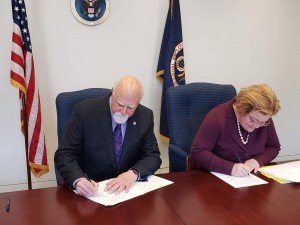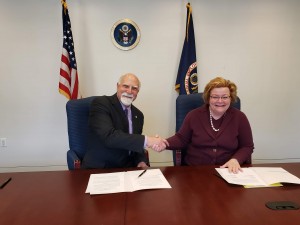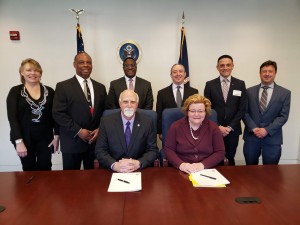WASHINGTON, D.C. — The U.S. Equal Employment Opportunity Commission (EEOC) and the Federal Mediation and Conciliation Service (FMCS) have officially committed to work together to resolve federal workplace disputes by utilizing Alternative Dispute Resolution (ADR) as a means of efficiently reducing the backlog of federal sector charges, the EEOC and FMCS announced today.

WASHINGTON, DC (April 11, 2019) Federal Mediation and Conciliation Service (FMCS) Director Nominee Richard Giacolone (left) and Equal Employment Opportunity Commission (EEOC) Acting Chair Victoria A. Lipnic sign a Memorandum of Agreement pledging the agencies to work together to resolve federal workplace disputes. (FMCS Photo/Greg Raelson)
In a ceremony at the EEOC, the EEOC Acting Chair Victoria A. Lipnic and FMCS Director Nominee Richard Giacolone signed a national memorandum of agreement, creating a voluntary working relationship between the two agencies. Under its terms, FMCS will work with the EEOC to identify parties involved in federal sector complaints and provide the opportunity to resolve pending conflicts prior to a decision by an Administrative Judge (AJ).
The agreement establishes a voluntary contractual working relationship where the EEOC will identify federal sector cases in its inventory suitable for mediation by FMCS. The parties to these cases will then work with the EEOC staff to get their cases before a FMCS mediator who will provide mediation services to the parties. The EEOC retains responsibility for the closure or continued processing of all cases. FMCS has tremendous talent and experience assisting parties in the resolution of disputes. Moreover, FMCS mediators are located across the country, which allow them the flexibility to conduct mediations wherever there is a need.
Created in 1947, FMCS is a government agency that helps build better relationships through joint problem-solving and constructive responses to inevitable conflict. In turn, this improves the ability of organizations to create value for customers, shareholders and employees alike and substantially benefits the national economy. FMCS concentrates its efforts on assisting employers and employees in coping with the demands of a rapidly changing workplace.

WASHINGTON, DC (April 11, 2019) Federal Mediation and Conciliation Service (FMCS) Director Nominee Richard Giacolone (left) and Equal Employment Opportunity Commission (EEOC) Acting Chair Victoria A. Lipnic shake hands following their signing of a Memorandum of Agreement pledging the agencies to work together to resolve federal workplace disputes. (FMCS Photo/Greg Raelson)ng workplace.
“Charges of discrimination in our federal workplaces are no less important than the private sector” said EEOC Acting Chair Lipnic. “During the past two years we increased hiring for AJ’s and implemented strategies to increase efficiency in the hearings program. This resulted in a 30 percent increase in resolutions and for the first time, a decrease in the pending inventory of hearings. However, we still need to do more. Achieving and maintaining a balanced and manageable inventory is crucial to providing quality customer service to our primary stakeholder: the American workforce. This agreement with FMCS allows us to do just that.”
Richard Giacolone said, “It is our pleasure to partner with the EEOC and provide our federal mediators to assist in resolving federal workplace disputes before the involvement of an AJ. Any time opposing parties can come together to make a mutually-agreeable decision is a positive development. With our expert mediators at the ready, we are happy to assist the EEOC in providing the most efficient and effective service to workers across the federal sector.”

WASHINGTON, DC (April 11, 2019) Representatives from the Federal Mediation and Conciliation Service (FMCS) and Equal Employment Opportunity Commission (EEOC) stand behind FMCS Director Nominee Richard Giacolone (front left) and EEOC Acting Chair Victoria A. Lipnic following their signing of a Memorandum of Agreement pledging the agencies to work together to resolve federal workplace disputes. (FMCS Photo/Greg Raelson)

